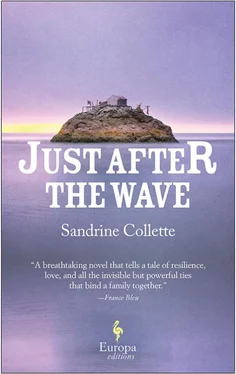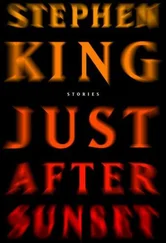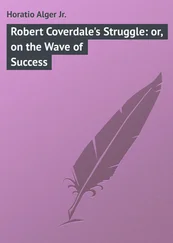“Potatoes!” shouts Noah when he tells them.
Noah’s eyes are shining, and he gazes out at the horizon, where the other island is, he wants his brother to leave right away. Louie looks at him out of the corner of his eye then, no, don’t look it him, don’t feel your heart sinking when you see this little boy with his scrawny arms, already out of breath from running to the shore—what did they do to him, the parents, the air, the earth; where did they fail, what did they forget?
Noah sits by the sea.
“Is that it, out there? The island? Can I come with you?”
“No. It’s dangerous.”
“And what if you sink?” asks Perrine.
Louie laughs, showing off a little. Course I won’t sink. Deep down, he’s not so sure.
“If there’s blue sky, I’ll go this afternoon.”
The little girl turns to look up with her good eye.
“For the time being it’s all gray.”
She stands with her head tilted, her nose up to the clouds. Sometimes Louie puts his hand in front of one eye, too, to be like her. With only one eye he can still see, of course, but it bothers him. To the left there is a big black shadow, he waves his other hand, cannot see it, yet he knows it is there. After a few minutes his right eye gets tired and his vision blurs. He closes his eyelids, rubs them, opens then again. He doesn’t say anything, so as not to make Perrine sad. She is surely used to it.
She was born with two big blue eyes. But one day the accident happened. Louie doesn’t remember, because he was taking his nap just then, and afterwards no one talked about it. No one ever talks about it. It’s like a closed metal shutter; the eldest ones keep the secret. Louie knows instinctively that the guilty party is among them, that it is either Pata or Madie, Liam or Matteo, but who, and how, the words have never been said. What sort of error, or negligence, or misplaced gesture. Perrine has a blind eye, and no one will ever restore the sight in that eye to her: he has stopped wondering.
But she can see, all the same, both the gray sky and the blue sky that slowly arrive over the course of the morning and make her happy: they will have potatoes, Louie promised. She loves them sautéed; she explains to Noah, as he stares at the empty frying pan, how to peel them, and how to let the oil get hot; she sends him to fetch two little logs so that the stove won’t go out, it mustn’t, they can make an omelet as well, but they’ve been eating omelets for four days. Just potatoes, nicely browned but not burned, soft but not crumbly, with salt and pepper—they have run out of butter or cheese to melt, never mind, they’ll add a bit more oil. Noah smells the herbs and spices left in the kitchen: rosemary, curry, basil. He wrinkles his nose. Thyme. He hands the jar to Perrine: this should do. All right , she says.
Louie is on the watch tower, still looking out at the horizon, studying the sky as it continues to turn blue. For a long time he hoped the weather wouldn’t improve, that the waves would stay black until evening; but now. He knows his siblings will come to him and ask. And he swore he wasn’t even afraid; from where he stands, he can see the little mound straight ahead, twenty minutes if he swims hard, forty minutes there and back, plus the time it will take to dig up a dozen plants, he is breathing hard as if he were already swimming, yes he’s scared. So he makes up his mind, without waiting for Perrine and Noah to pester him. He jumps down from the tower and runs up to the house:
“I’m on my way. Noah, you’re on watch.”
* * *
And it’s not the sky that betrays Louie that day, not at all, even if it is the sky the boy keeps looking at as he swims, then as he digs frenetically to unearth the potatoes, a strange late afternoon impression, time to go home, but there’s only blue up there and the clouds have headed north; were it not for that strange alarm ringing in his mind Louie would just think that it has suddenly gotten too hot. He tries to keep calm as he counts the potatoes he has thrown into the bag. When he reaches forty he wipes his hands on his shorts, ties the bag with the string, and fastens it to the swim ring, his feet already in the water.
That’s when it begins.
With a sudden little noise: psssshhhh.
Louie freezes, refuses to believe it, finally gives a start, No, no. He listens. His fingers tighten on the swim ring, and it seems to him to be getting softer. With an extreme effort, he turns it over: the roots of bushes growing on the shore, laid bare by the waves, have made a hole. Now he shouts: “No!”
A reflex. He slams his hand over the leak. Without thinking, he begins kicking his feet. He can see his island, their island, just over there. Twenty minutes with his hand over the hole. It has to work. In haste, he considers untying the bag on his right, to rid himself of the weight, but he would need both hands.
Never mind.
Swimming fit to burst his legs and his heart. After a few minutes he has to stop, breathless. He rests his chin on the swim ring: it deflates slightly. He wants to get going again, he can’t, he’s out of breath, mouth open, gasping for air. Putting one arm around the air pump, he waits. He can hear the faint sound of air escaping under his hand.
He thinks, easy now.
He looks at the sky as if it were the horizon: there, it’s over there. He mustn’t look for his island, it will seem too far away, and make him want to cry.
Then he sets off again.
Feet kicking rhythmically, slowly, his legs burning inside.
And the swim ring.
When he is fifty yards from the shore he knows he will make it, even if the swim ring sinks.
It doesn’t sink.
Out of breath, he steps on the island, collapses to his knees. And he immediately notices that there is something wrong. Before the words even take shape in his mind, it surges through his body, a discharge of shock and fear. He leaves the punctured swim ring to the waves, the sack of potatoes on the shore, and leaps to his feet.
For a start, there is no one on the watchtower.
And there is blood on the ground.
His breathing, hoarse and heavy, at the foot of the deserted tower. Louie puts one hand on the cinder blocks to support himself. He can see the blood ten yards away.
The blood, but not only: the lump of flesh next to it.
He knows what it is. He recognizes it. That’s why he’s holding on to the tower. Once again he is gasping for breath, in shock, he ought to sit down but there’s nothing, so he collapses on the ground and is afraid he won’t be able to get up. His nails scratch the warm cinder block, and gradually he gets his breath back.
At the same time, tears. The only thought he has is, I’ll kill them.
A manner of speaking. But those really are the only words that spring to mind at that moment.
One step, then another. He glances around furtively, then turns away without stopping: yes, it is indeed one of the hens lying there. Well, its head. He imagines that the rest of it is in the pot.
I’ll kill them.
The fact they took advantage of his absence, when he was going to get potatoes in order to feed them , to make them happy, to be able to spare his hens. He had told them he didn’t want to. They weren’t hungry enough, not yet. He can’t help but see the image of the severed head again: which one did they take? Chosen at random, of course. The one that was easiest to catch. A black one. He goes through their names in his mind.
Rage.
Which hampers his breathing, enough to cause the walls to tremble when he goes into the house and roars:
“What have you done, shit !”
Читать дальше












